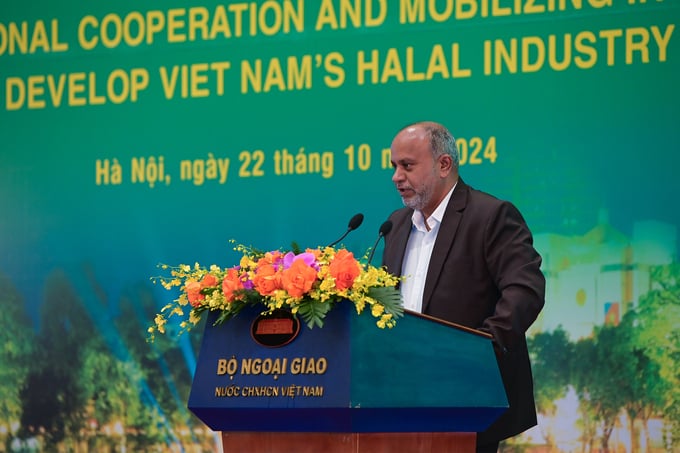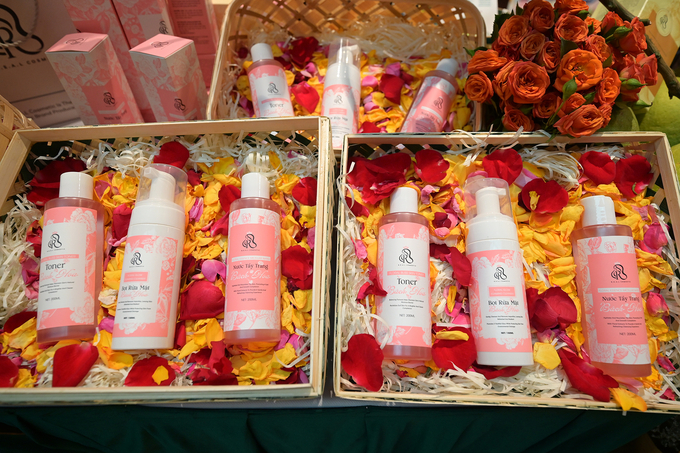November 25, 2025 | 03:00 GMT +7
November 25, 2025 | 03:00 GMT +7
Hotline: 0913.378.918
November 25, 2025 | 03:00 GMT +7
Hotline: 0913.378.918
According to Ms. Kim Weon Suk, Executive Director of Korean Halal Authorities, the Halal industry in the country has experienced significant growth in recent years.
South Korea, a nation regarded for its innovative and high-quality production processes, discovered the potential of the global Halal market at an early stage. Then, the Korean Government and the Korean Halal Authorities prioritize the uphold of the Halal standard in numerous sectors.

Dr. Mohamed Jinna, CEO of the Halal Authority of India, shares his expertise and the potential for collaboration in the Halal sector with Vietnam. Photo: Tung Dinh.
"We prioritize the production of cosmetic, beverage, food, and pharmaceutical products, in addition to guaranteeing that all Korean producers adhere to the international Halal standard," stated Ms. Kim Weon Suk.
The Halal certification, according to this female director, offers Korean products the opportunity to access large markets such as the Middle East, Southeast Asia, and beyond, where there is a strong demand for Halal-compliant goods.
South Korea's cosmetics industry, which is globally renowned for its quality, is currently concentrating on adhering to Halal standards in order to satisfy the increasing demand from Muslim consumers in the Middle East and Southeast Asia.
Meanwhile, India's strategy for the development of its Halal industry is to optimize the Halal certification procedure in order to increase its global competitiveness. Consequently, it is imperative that products not only satisfy the necessary criteria but also establish the confidence of Muslim consumers worldwide. Halal certification serves as a conduit between suppliers and the global Muslim community, facilitating unprecedented trade, partnerships, and investment.
Dr. Mohamed Jinna, CEO of the Halal Authority of India, confirmed that the certification procedure must be globally recognized, transparent, and seamless in the current competitive market. Consequently, he urges businesses and authorities to allocate resources toward the modernization and standardization of the Halal certification process.
"This will enable countries to establish themselves as reputable and reliable suppliers of Halal products that adhere to international standards," stated the president of the Halal Authority of India. Dr. Mohamed Jinna emphasized that the optimization of the certification process is not merely an administrative task, but a strategic approach to improve global competitiveness.
Suppliers can guarantee that their products satisfy the rigorous standards of Halal markets worldwide by establishing partnerships with internationally recognized Halal certification organizations. Businesses will be able to export to majority-Muslim nations within the Organization of Islamic Cooperation (OIC) and beyond with confidence, thereby unleashing new trade opportunities.
Vietnam is currently experiencing an increase in the demand for Halal certification, as well as a burgeoning Muslim population, according to Ms. Kim Weon Suk. Consequently, the potential for collaboration in the Halal sector with Vietnam is more accessible than ever.

Cosmetics and pharmaceuticals are popular items among Halal consumers and can be utilized in Halal tourism business ventures. Photo: Tung Dinh.
In terms of the certification system, Vietnam and South Korea could harmonize their Halal certification systems, thereby fostering a more conducive environment for businesses to access international markets and bolstering Halal standards. The CEO confirmed that the Korean Halal Certification Agency is eager to provide Vietnam with its expertise in order to assist local businesses in traversing the intricate Halal certification process and guarantee that their products meet international standards.
By encouraging the exchange of Halal-certified products, South Korea and Vietnam could improve their bilateral trade and investment. There is substantial potential for South Korea's pharmaceutical, cosmetic, and food industries to supply the Vietnamese market.
In contrast, Vietnamese businesses have the option to export their Halal-certified products to South Korea and other global markets. Not only will the Vietnamese and South Korean industries expand, but the demand for Halal products in both countries will also be met by bolstering trade in Halal products.
Lastly, the exchange of knowledge and expertise is one of the most critical pathways for cooperation. South Korea is prepared to provide technical support, seminars, and joint training initiatives to assist Vietnam in the construction of Halal infrastructure. By working together, the two nations can establish a robust Halal ecosystem in Vietnam, which will be advantageous to both consumers and enterprises.
Vietnam has tremendous potential in Halal tourism, according to Dr. Mohamed Jinna: "Halal tourism is one of the most exciting opportunities for Vietnam." Vietnam has the potential to become a top destination for Muslim visitors as the Muslim tourism market continues to expand, with an anticipated value of USD 300 billion by 2026.
Vietnam's diversified gastronomy, breathtaking natural landscapes, and rich cultural heritage render it an appealing destination for travelers from all over the globe. In order to capitalize on this opportunity, the CEO of the Halal Authority of India is of the opinion that Vietnam's tourism sector must adopt and implement Halal standards, given his expertise. Halal cuisine, prayer spaces, and a welcoming environment are essential amenities that hotels, restaurants, and tourist facilities must provide to accommodate the unique requirements of Muslim travelers.
These measures will not only increase Vietnam's share in the global Muslim tourism market but also enhance its reputation as a Halal-friendly destination, thereby propelling economic development in this highly promising sector.
Translated by Linh Linh

(VAN) An Giang promotes supply-demand connections, standardizes quality and builds value chains, creating a foundation for sustainable bird’s nest development and aiming to expand exports.
/2025/11/24/5339-4-nongnghiep-075331.jpg)
(VAN) Recently, the conference on 'Sustainable Fisheries Linkage Chain - Tilapia for Export' took place in Tien Hai commune, Hung Yen province.
/2025/11/21/4309-2-153400_128.jpg)
(VAN) Green and low-emission rice is paving the way for Vietnamese rice to enter high-end markets, marking the beginning of a transformation journey toward greening and elevating the national rice brand.

(VAN) ‘Right to Win’ outlines a national action plan that shapes a new vision for Viet Nam’s agriculture in an era of renewal and global integration.

(VAN) Lam Dong’s farmed sturgeon output this year is expected to reach 2,300 tons, worth VND 450 billion, affirming the brand’s position on the market.

(VAN) A surge in Ukrainian egg exports, largely driven by soaring sales to the UK over the last few years, has notably pushed up egg prices on the domestic market.

(VAN) The price of Arabica Catimor coffee in Quang Tri is currently at VND 25,000–27,000/kg (fresh cherries), the highest level ever recorded